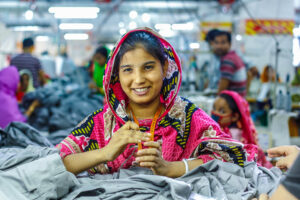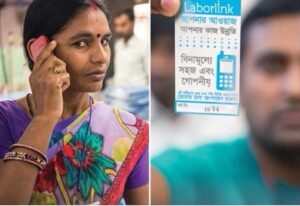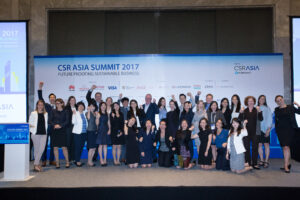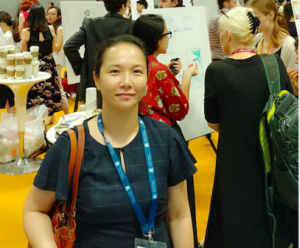By Christina Ameln, CSR | Sustainability Advisor –
An Exchange with Chau Tran, Director of Southeast Asia, ELEVATE.
When we look at a region like Europe, we see dynamic engagement on sustainability issues. Can that dynamism be seen in a region as vast and diverse as Asia? What trends dominate? How does international behaviour impact sustainability in this region? Where is the leadership? What does it mean to say that progress ‘takes a village’?
Addressing these questions in a short, succinct article is just short of overwhelming. Luckily, I had the help of an exchange with Chau Tran, Director for Southeast Asia from consultancy firm ELEVATE. Headquartered in Hong Kong, with a focus on business risk and sustainability solutions, ELEVATE has a reach across the region and globally. Chau is steeped in sustainability issues, both in her position at ELEVATE and from the vast experience she brings to the topic.
Sustainability Developments
Reflecting on our exchange, I am struck by how Asia’s growth over the years has skyrocketed and how its markets have matured. This is also true for action – and understanding – on issues around sustainability. Chau and I have both observed this at country and regional level, for example, by the increased number of stakeholders active in the field, the range of areas being addressed and increased awareness at all levels.
Chau pinpoints some of the significant social and environmental trends emerging from the annual research conducted by its subsidiary, CSR Asia (CSR Asia is one of the early pioneers on sustainability in the region). As she notes: “An ongoing priority was and will be climate change and its implications for businesses. Supply chain management has climbed the ranks to second place although it barely got mentioned 5 years ago. And, recent developments such as China’s legislative changes related to waste imports have become topics of concern for local businesses”.
The research also suggests that business is becoming a driving force for social and environmental issues, as opposed to government and civil society. “Its contribution has increased significantly in the last five years”, Chau confirms, “It is partly driven by international frameworks such as the UN Guiding Principles on Business and Human Rights, partly by an increasing recognition of real resource scarcity that requires efficient and innovative product development and partly by the increasing awareness of sustainability issues amongst Asia’s millennials.”
Beyond the research, implementation of the Sustainable Development Goals (SDGs) is a strategic driver of sustainability. Chau believes that investors are also pushing the envelope: “We see Singapore emerging as a regional hub for responsible investment and engagement with a growing number of Asian and global investors.” And one of the biggest growth industries in leisure and business – the hospitality and tourism sectors – is, in Chau’s view – “starting to address difficult new issues such as human trafficking in their food supply chain or through forced prostitution and forced labour in construction”.
We are both convinced that the missing link in the growth of a sustainability mindset in Asia and beyond is impact– understanding it, measuring it, communicating about it and reporting on it. I was recently reminded of this as I moderated a panel of international frameworks and guidelines experts and looked out on a room full of glazed eyes and confused faces. That was a tough hour!
Growth and Evolution
Many are concerned that Asia’s dizzying economic growth is occurring at the expense of sustainability. Indeed, some recent decisions seem to point in that direction. However, Chau believes that there is a positive side to this. She uses Vietnam, where I am currently, as an example of a country that has both ends of the spectrum – lots of opportunities interspersed with pitfalls for investors and sustainability advocates, such as supply chain, environment and waste issues, etc.
“With growth generally comes increased use of resources such as fossil fuels. River water and air pollution and waste management are big challenges in Vietnam. However, on the positive side, our analysis suggests that reliability of payments to workers in Vietnam has not decreased with larger amounts of production and manufacturing sites, and in many cases, the actual wage level is higher than the legal minimum. Also, Vietnam’s rating in the Human Development Index has improved.”
While one country might be moving in a sustainable direction, other countries are lagging behind. A little known fact, for example, is that China used to be the biggest importer of waste internationally until it changed the legislation earlier this year and banned 24 types of scraps from entering its borders. While hailed as an environmental victory, this is likely to have impacts on other countries in the region. Countries (some from Europe) do not know what to do with the waste they originally sent to China. Other countries in the region (with probably less suitable waste separation and recycling facilities) are stepping in and offering to meet the international demand of waste disposal for short term gains. “We see this as a risk with potentially terrible environmental consequences in the region. However, instead of blaming the opportunism of some to take on this waste in exchange for cash, it is time to rethink how to reduce and manage waste globally and support sustainable solutions.”
One would wish that with sharp climbs in development would come improvement in sustainability. But despite some positive examples, sustainability needs much greater focus and coordination. And let’s not forget that decisions in the ‘dynamic sustainable’ Europe often have impacts – both positive and negative – in other regions.
Leadership Through Responsible Business
So, business has become a central champion of sustainability – but it can do more. ELEVATE works with many of the Asian companies that embody these positive examples, but progress remains erratic. “There is always a spectrum of companies: those that are still asking for the business case for sustainability and those that are integrating sustainability into their core operations. Having said that, the number of highly engaged and openly leading companies is still lower in Asia compared to the US and European markets.”
Chau sees progress in local legislative changes, such as ESG (Environmental, Social and Governance) reporting requirements in Hong Kong and across ASEAN. She is also encouraged by global measures like the recent Australian Modern Slavery Bill. All these laws challenge “regional reluctance for more transparency” and at the same time reaffirm compliance as a main driver in Asia.
 In addition, Chau points out that business leadership does not only come from the top. Suppliers and manufacturers in the lower tiers are being asked to implement sustainability and labour standards alongside quality, which helps to drive the agenda in Asia as sustainability becomes part of “business as usual”.
In addition, Chau points out that business leadership does not only come from the top. Suppliers and manufacturers in the lower tiers are being asked to implement sustainability and labour standards alongside quality, which helps to drive the agenda in Asia as sustainability becomes part of “business as usual”.
This was further confirmed to me by the point person for compliance for a Swiss crayons manufacturer in Vietnam. His take is that the power of the brands and their influence on suppliers will ensure that sustainability remains on the agenda in Asia.
I personally categorize both these comments as faith in ‘reversed leadership’ that relies on bottom-up and sideways approaches. And indeed, compliance – whether based on reporting requirements or factory certifications – is one of the crucial foundations for sustainability in this region.
Even sitting in different countries, we hope, over time, to see more strategic, embedded and innovative engagement in sustainability across the region.
Oversight Along the Supply Chain
Contradictions occur when brand influence is partial, especially as companies have limited oversight beyond their first-tier suppliers. Chau draws attention to the consensus in the industry that, “poor purchasing practices of retailers, e.g. last-minute changes to orders, can put financial and time pressure on manufacturers, which can lead to unauthorized subcontracting to facilities with potential worse environmental protection or labour conditions”.
 So instead of brands and retailers pushing their standards and requirements through a complex international network of suppliers, she sees a trend towards encouraging more transparency, leading to better capacity planning and ultimately supplier ownership. Chau believes that worker-management dialogue is key and is proud to acknowledge ELEVATE’s work in integrating direct worker feedback into its processes.
So instead of brands and retailers pushing their standards and requirements through a complex international network of suppliers, she sees a trend towards encouraging more transparency, leading to better capacity planning and ultimately supplier ownership. Chau believes that worker-management dialogue is key and is proud to acknowledge ELEVATE’s work in integrating direct worker feedback into its processes.
“In fact, we were awarded ‘Most Innovative New Programme Award’ for the second time in a row by Sedex for our pilot in collaboration with Vodafone and Target in India, Nepal and Malaysia. The goal of this collaboration is to prevent modern slavery in lower-tier supply chains by analysing worker feedback not just at production sites but also in their wider operating environment and their communities of origin.”
‘It Takes a Village’
Collaboration is key. As the saying goes, ‘it takes a village’ to work on sustainability – everyone in a nation, a community and at all levels in a business. Instead of diluting the sustainability agenda, Chau sees mass participation as enriching it. “For sustainability to be effective and business-driven, it needs to be embedded across all areas of the business from the strategic C-suite to operations to public communications.”
 History suggests that sustainability will not go away. I feel a little (just a little…) old when Chau reminds me that corporate sustainability has been around for about 20 years, coming on the heels of business philanthropy and the environmental movement. The field of early pioneers, now true and recognized experts, have rooted themselves into other disciplines.
History suggests that sustainability will not go away. I feel a little (just a little…) old when Chau reminds me that corporate sustainability has been around for about 20 years, coming on the heels of business philanthropy and the environmental movement. The field of early pioneers, now true and recognized experts, have rooted themselves into other disciplines.
“In general, the field has progressed from being driven by environmental enthusiasts and scientists to becoming a more generalist playing field, valuing soft skills from stakeholder engagement to strategy development and change management. We now see another shift to various specializations within the field, e.g. evaluation and impact assessment, reporting, supply chain management and human rights.”
Each company has a different strategy for sustainability, from one person shows to well-equipped departments. An interesting company is IKEA. At last year’s CSR Asia conference in Bangkok, I was impressed by IKEA’s work and its presentation on sustainable lifestyles: to embed sustainability so deeply in its day-to-day work that ‘experts’ will be obsolete. Sustainability will be part of everyone’s job description.
Chau states: “So, more people working on sustainability is a good thing if we want transformative change. Yet of course, we must challenge all people working in this area to deliver quality work and to measure the impact of their project and activities.This is the key challenge.”
 And ‘people’ will be better equipped to contribute to the ‘village’ if they have the right tools. As Chau comments: “Besides collaboration, technology i.e. digitalisation provides huge opportunities to increase traceability, thereby re-enforcing transparency and collaboration.”
And ‘people’ will be better equipped to contribute to the ‘village’ if they have the right tools. As Chau comments: “Besides collaboration, technology i.e. digitalisation provides huge opportunities to increase traceability, thereby re-enforcing transparency and collaboration.”
Hope Lies in Momentum
For Chau, hope for Asia to be truly sustainable lies in momentum, momentum in facing up to formidable challenges. Chau cites just a few: “… forced labour and modern slavery, climate change, water and waste management, gender and diversity, food security, as well as strategic corporate governance on sustainability issues that promote transparency, reduce falsification of records and support supplier ownership in order to tackle exploitative working conditions. Solving these problems will require our collective efforts for years to come. They are preconditions to the transformation that sustainability requires”.
The list is daunting but I like the word momentum. There is a dynamism in it. And dynamism is evident everywhere one looks in Asia.
For more information:
- About: Chau Tran, Director of Southeast Asia, ELEVATE
- Website: www.elevatelimited.com
- For regional expertise and collaboration: CSR Asia Summit 2018
About ELEVATE:
ELEVATE is the leading business risk and sustainability solutions provider. We deliver improved organizational performance through sustainability and supply chain assessment and auditing, consulting, program management and analytics. We shape the industry with our innovative solutions to complex problems, by designing and implementing customized programs and technology that provide complete insight into risk and improve supply chain and sustainability performance.
ELEVATE is headquartered in Hong Kong, and the company’s 475 employees oversee work in over 110 countries through dedicated offices in Australia, Bangladesh, Brazil, China, Germany, Hong Kong SAR, India, Italy, Japan, Mexico, Pakistan, Singapore, Taiwan, Thailand, Turkey, UK, USA and Vietnam.
First published on August 29, 2018 on Linkedin.



